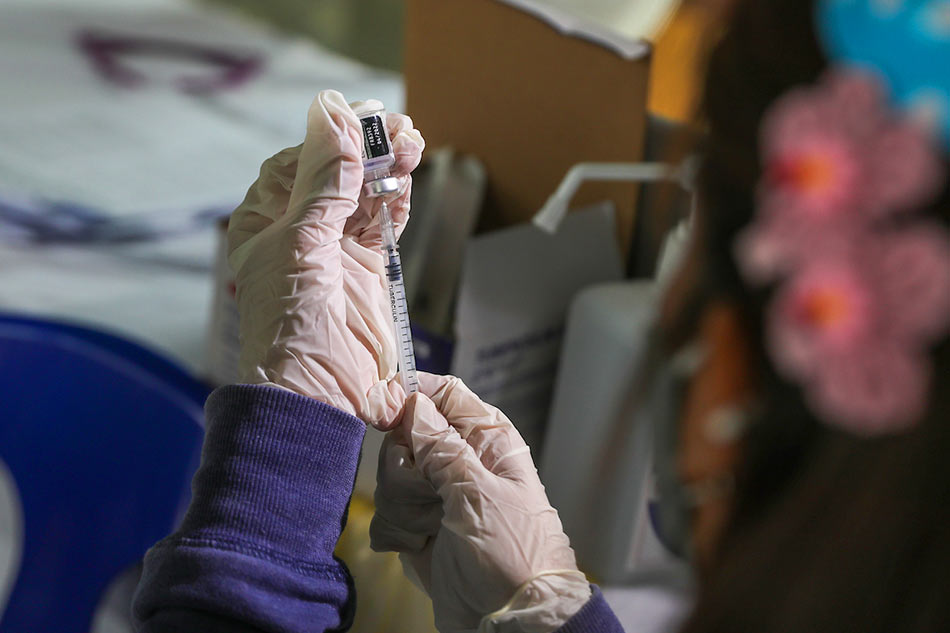Despite new WHO study, PH to retain 3-week interval for kids' COVID vaccine | ABS-CBN

Welcome, Kapamilya! We use cookies to improve your browsing experience. Continuing to use this site means you agree to our use of cookies. Tell me more!
Despite new WHO study, PH to retain 3-week interval for kids' COVID vaccine
Despite new WHO study, PH to retain 3-week interval for kids' COVID vaccine
Wena Cos,
ABS-CBN News
Published Feb 16, 2022 01:01 PM PHT
MANILA - The Philippines will continue implementing a 21 day interval between the first and second doses of the reformulated Pfizer vaccine for children aged 5 to 11 years old, despite new data from the World Health Organization saying that the second dose should be administered 4 to 8 weeks after the first.
MANILA - The Philippines will continue implementing a 21 day interval between the first and second doses of the reformulated Pfizer vaccine for children aged 5 to 11 years old, despite new data from the World Health Organization saying that the second dose should be administered 4 to 8 weeks after the first.
"We have to review the data that we have na kapag binigay after 8 weeks ay better ang immune response. Right now it is three weeks at least, or 4 weeks. We may have to get those data to make such recommendation but right now wala pang data sa atin," Dr. Nina Gloriani, Chairman of the Vaccine Expert Panel said on Wednesday.
"We have to review the data that we have na kapag binigay after 8 weeks ay better ang immune response. Right now it is three weeks at least, or 4 weeks. We may have to get those data to make such recommendation but right now wala pang data sa atin," Dr. Nina Gloriani, Chairman of the Vaccine Expert Panel said on Wednesday.
According to WHO, longer interval between doses is "associated with higher vaccine effectiveness and potentially lower risk of myocarditis or pericarditis," Gloriani mentioned in an online forum by the Department of Health.
According to WHO, longer interval between doses is "associated with higher vaccine effectiveness and potentially lower risk of myocarditis or pericarditis," Gloriani mentioned in an online forum by the Department of Health.
However, status quo will be followed until said study is reviewed by the Vaccine Expert Panel.
However, status quo will be followed until said study is reviewed by the Vaccine Expert Panel.
ADVERTISEMENT
Gloriani said Philippines followed the shorter interval between doses to "balance the effect of omicron."
Gloriani said Philippines followed the shorter interval between doses to "balance the effect of omicron."
The country recorded an increase in cases attributed to the more infectious omicron variant in January, with peaks surpassing that of the delta surge in 2021.
The country recorded an increase in cases attributed to the more infectious omicron variant in January, with peaks surpassing that of the delta surge in 2021.
The Center for Disease Control and Prevention still recommends a 2-dose series separated by 21 days for the reformulated Pfizer COVID-19 vaccine intended for children aged 5-11 years old.
The Center for Disease Control and Prevention still recommends a 2-dose series separated by 21 days for the reformulated Pfizer COVID-19 vaccine intended for children aged 5-11 years old.
Dr. Wilda Silva, DOH National Immunization Campaign Program Manager, added that while myocarditis (inflammation of the heart muscle) were noted after receiving mRNA COVID-19 vaccines such as Pfizer, cases are very rare.
Dr. Wilda Silva, DOH National Immunization Campaign Program Manager, added that while myocarditis (inflammation of the heart muscle) were noted after receiving mRNA COVID-19 vaccines such as Pfizer, cases are very rare.
"Most people with myocarditis after vaccination with simple treatment they can recover. However if you get it from a viral infection, this can be very severe," Silva warned.
"Most people with myocarditis after vaccination with simple treatment they can recover. However if you get it from a viral infection, this can be very severe," Silva warned.
The risk of getting myocarditis from a COVID-19 infection is 4 to 8 times higher for unvaccinated individuals, according to Silva.
The risk of getting myocarditis from a COVID-19 infection is 4 to 8 times higher for unvaccinated individuals, according to Silva.
On the other hand, there is only 1 in 200,000 chance of getting myocarditis after a COVID-19 vaccination.
On the other hand, there is only 1 in 200,000 chance of getting myocarditis after a COVID-19 vaccination.
She reiterated that most adverse effects following immunization among the 5 to 11 age group are mild and treatable, such as headaches, rashes, and fever.
She reiterated that most adverse effects following immunization among the 5 to 11 age group are mild and treatable, such as headaches, rashes, and fever.
"A review of adverse effects, severe adverse effects, and adverse effects of clinical interest suggest no short-term safety concerns," Silva said.
"A review of adverse effects, severe adverse effects, and adverse effects of clinical interest suggest no short-term safety concerns," Silva said.
There were also no reported cases of myocarditis and pericarditis 3 months after inoculation in the age group thus far.
There were also no reported cases of myocarditis and pericarditis 3 months after inoculation in the age group thus far.
Read More:
COVID
COVID-19
bakuna
pediatric vaccination
vaccine
vaccination
5-11 years old
Pfizer
myocarditis
side effects
ADVERTISEMENT
ADVERTISEMENT


